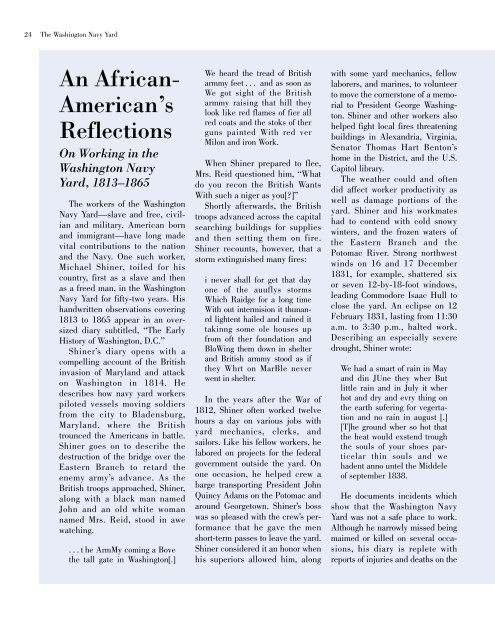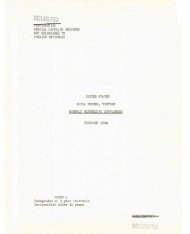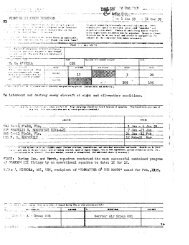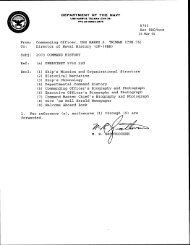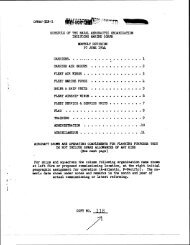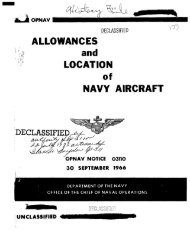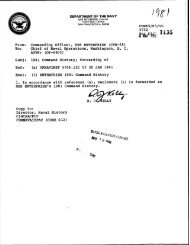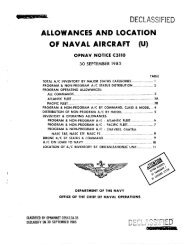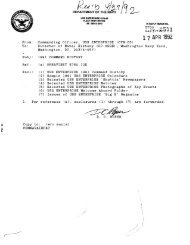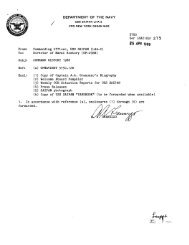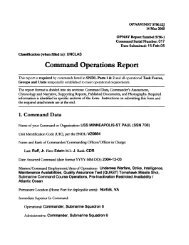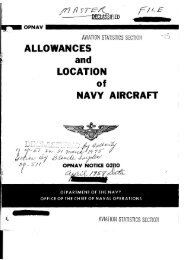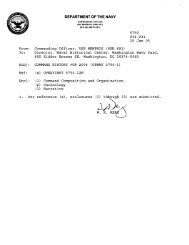the washington navy yard - Naval History and Heritage Command ...
the washington navy yard - Naval History and Heritage Command ...
the washington navy yard - Naval History and Heritage Command ...
You also want an ePaper? Increase the reach of your titles
YUMPU automatically turns print PDFs into web optimized ePapers that Google loves.
24<br />
The Washington Navy Yard<br />
An African-<br />
American’s<br />
Reflections<br />
On Working in <strong>the</strong><br />
Washington Navy<br />
Yard, 1813–1865<br />
The workers of <strong>the</strong> Washington<br />
Navy Yard—slave <strong>and</strong> free, civilian<br />
<strong>and</strong> military, American born<br />
<strong>and</strong> immigrant—have long made<br />
vital contributions to <strong>the</strong> nation<br />
<strong>and</strong> <strong>the</strong> Navy. One such worker,<br />
Michael Shiner, toiled for his<br />
country, first as a slave <strong>and</strong> <strong>the</strong>n<br />
as a freed man, in <strong>the</strong> Washington<br />
Navy Yard for fifty-two years. His<br />
h<strong>and</strong>written observations covering<br />
1813 to 1865 appear in an oversized<br />
diary subtitled, “The Early<br />
<strong>History</strong> of Washington, D.C.”<br />
Shiner’s diary opens with a<br />
compelling account of <strong>the</strong> British<br />
invasion of Maryl<strong>and</strong> <strong>and</strong> attack<br />
on Washington in 1814. He<br />
describes how <strong>navy</strong> <strong>yard</strong> workers<br />
piloted vessels moving soldiers<br />
from <strong>the</strong> city to Bladensburg,<br />
Maryl<strong>and</strong>, where <strong>the</strong> British<br />
trounced <strong>the</strong> Americans in battle.<br />
Shiner goes on to describe <strong>the</strong><br />
destruction of <strong>the</strong> bridge over <strong>the</strong><br />
Eastern Branch to retard <strong>the</strong><br />
enemy army’s advance. As <strong>the</strong><br />
British troops approached, Shiner,<br />
along with a black man named<br />
John <strong>and</strong> an old white woman<br />
named Mrs. Reid, stood in awe<br />
watching.<br />
. . . t he ArmMy coming a Bove<br />
<strong>the</strong> tall gate in Washington[.]<br />
We heard <strong>the</strong> tread of British<br />
armmy feet . . . <strong>and</strong> as soon as<br />
We got sight of <strong>the</strong> British<br />
armmy raising that hill <strong>the</strong>y<br />
look like red flames of fier all<br />
red coats <strong>and</strong> <strong>the</strong> stoks of <strong>the</strong>r<br />
guns painted With red ver<br />
Milon <strong>and</strong> iron Work.<br />
When Shiner prepared to flee,<br />
Mrs. Reid questioned him, “What<br />
do you recon <strong>the</strong> British Wants<br />
With such a niger as you[?]”<br />
Shortly afterwards, <strong>the</strong> British<br />
troops advanced across <strong>the</strong> capital<br />
searching buildings for supplies<br />
<strong>and</strong> <strong>the</strong>n setting <strong>the</strong>m on fire.<br />
Shiner recounts, however, that a<br />
storm extinguished many fires:<br />
i never shall for get that day<br />
one of <strong>the</strong> auuflys storms<br />
Which Raidge for a long time<br />
With out intermision it thunanrd<br />
lightent hailed <strong>and</strong> rained it<br />
takinng some ole houses up<br />
from oft <strong>the</strong>r foundation <strong>and</strong><br />
BloWing <strong>the</strong>m down in shelter<br />
<strong>and</strong> British armmy stood as if<br />
<strong>the</strong>y Whrt on MarBle never<br />
went in shelter.<br />
In <strong>the</strong> years after <strong>the</strong> War of<br />
1812, Shiner often worked twelve<br />
hours a day on various jobs with<br />
<strong>yard</strong> mechanics, clerks, <strong>and</strong><br />
sailors. Like his fellow workers, he<br />
labored on projects for <strong>the</strong> federal<br />
government outside <strong>the</strong> <strong>yard</strong>. On<br />
one occasion, he helped crew a<br />
barge transporting President John<br />
Quincy Adams on <strong>the</strong> Potomac <strong>and</strong><br />
around Georgetown. Shiner’s boss<br />
was so pleased with <strong>the</strong> crew’s performance<br />
that he gave <strong>the</strong> men<br />
short-term passes to leave <strong>the</strong> <strong>yard</strong>.<br />
Shiner considered it an honor when<br />
his superiors allowed him, along<br />
with some <strong>yard</strong> mechanics, fellow<br />
laborers, <strong>and</strong> marines, to volunteer<br />
to move <strong>the</strong> cornerstone of a memorial<br />
to President George Washington.<br />
Shiner <strong>and</strong> o<strong>the</strong>r workers also<br />
helped fight local fires threatening<br />
buildings in Alex<strong>and</strong>ria, Virginia,<br />
Senator Thomas Hart Benton’s<br />
home in <strong>the</strong> District, <strong>and</strong> <strong>the</strong> U.S.<br />
Capitol library.<br />
The wea<strong>the</strong>r could <strong>and</strong> often<br />
did affect worker productivity as<br />
well as damage portions of <strong>the</strong><br />
<strong>yard</strong>. Shiner <strong>and</strong> his workmates<br />
had to contend with cold snowy<br />
winters, <strong>and</strong> <strong>the</strong> frozen waters of<br />
<strong>the</strong> Eastern Branch <strong>and</strong> <strong>the</strong><br />
Potomac River. Strong northwest<br />
winds on 16 <strong>and</strong> 17 December<br />
1831, for example, shattered six<br />
or seven 12-by-18-foot windows,<br />
leading Commodore Isaac Hull to<br />
close <strong>the</strong> <strong>yard</strong>. An eclipse on 12<br />
February 1831, lasting from 11:30<br />
a.m. to 3:30 p.m., halted work.<br />
Describing an especially severe<br />
drought, Shiner wrote:<br />
We had a smart of rain in May<br />
<strong>and</strong> din JUne <strong>the</strong>y wher But<br />
little rain <strong>and</strong> in July it wher<br />
hot <strong>and</strong> dry <strong>and</strong> evry thing on<br />
<strong>the</strong> earth sufering for vegertation<br />
<strong>and</strong> no rain in august [.]<br />
[T]he ground wher so hot that<br />
<strong>the</strong> heat would exstend trough<br />
<strong>the</strong> souls of your shoes particelar<br />
thin souls <strong>and</strong> we<br />
hadent anno untel <strong>the</strong> Middele<br />
of september 1838.<br />
He documents incidents which<br />
show that <strong>the</strong> Washington Navy<br />
Yard was not a safe place to work.<br />
Although he narrowly missed being<br />
maimed or killed on several occasions,<br />
his diary is replete with<br />
reports of injuries <strong>and</strong> deaths on <strong>the</strong>


